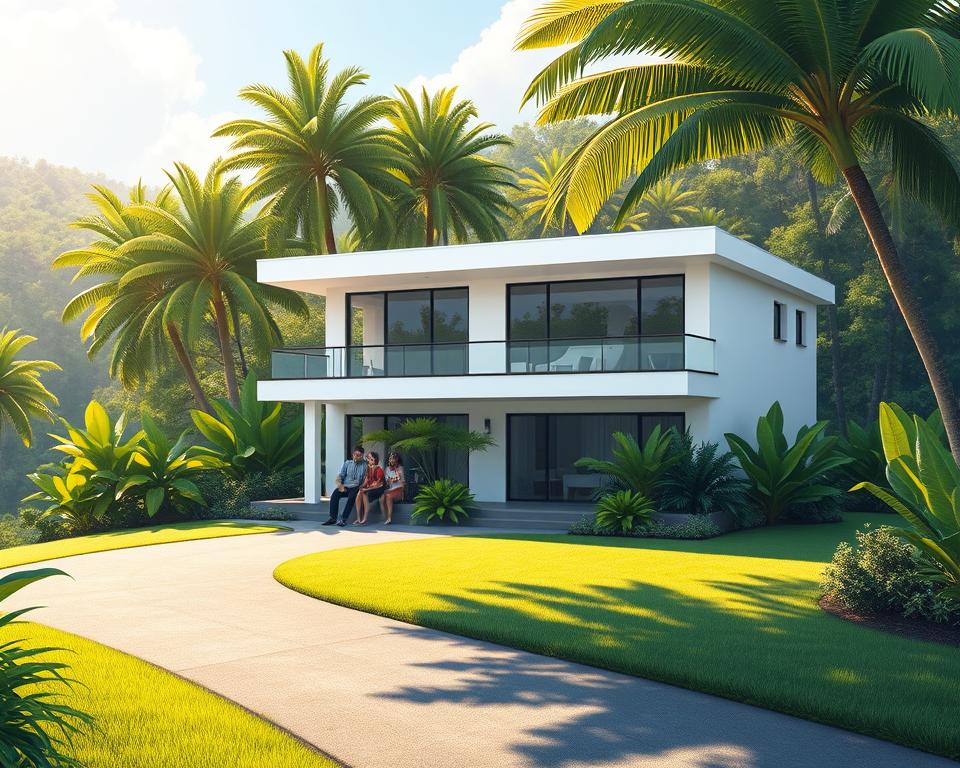Costa Rica Home Buying Process for First-Time Buyers
Costa Rica has become a haven for expats and international investors alike, drawn by its lush landscapes, stable political climate, and welcoming environment. With over two decades of experience, Gap Real Estate simplifies the journey of buying, selling, or investing in property here.
Foreign investment in Costa Rica’s real estate has seen a significant surge, with a growth of over 30 percent in the past three years, according to the Costa Rican Chamber of Real Estate Brokers. We will guide you through the intricacies of the property buying process, ensuring that first-time buyers are well-equipped to navigate this exciting journey.
Our comprehensive guide covers everything from understanding property ownership rights to working with the right professionals, helping you avoid common pitfalls and make informed decisions throughout your property purchase journey.
Understanding Property Ownership Rights in Costa Rica
Understanding property rights in Costa Rica is essential for a smooth transaction, whether you’re a local or a foreign buyer. Property ownership in Costa Rica is generally straightforward for foreigners, but there are specific regulations and restrictions, particularly concerning the Maritime Zone.
Equal Rights for Foreigners and Locals
In Costa Rica, foreigners have the same property ownership rights as locals, making it an attractive destination for foreign investment. This equality in property rights simplifies the buying process for non-citizens. However, certain restrictions apply, especially in coastal areas.
Maritime Zone Regulations and Restrictions
The Maritime Zone in Costa Rica, which includes the first 200 meters from the high tide line, has specific regulations. The first 50 meters is public land, and the next 150 meters can be leased through concessions. Foreigners can own up to 49% of Maritime Zone land, but there are exceptions, such as in Jaco Beach and Los Suenos, where land is titled up to the 50-meter line.
- The Maritime Zone consists of the first 200 meters from the high tide line, with specific regulations.
- The first 50 meters is public land, ensuring public beach access.
- Foreigners can own up to 49% of the Maritime Zone land.
- Exceptions exist, such as in Jaco Beach and Los Suenos.
Types of Properties Available in Costa Rica
Costa Rica offers a diverse range of properties for potential buyers to choose from. The country’s varied landscapes and climates allow for a wide array of real estate options, catering to different preferences and investment goals.
Beachfront and Ocean View Properties
Beachfront and ocean view properties in Costa Rica are highly sought after. These properties offer stunning views and direct access to the ocean, making them ideal for those looking to invest in a vacation home or rental property.
Mountain and Jungle Estates
For those seeking a more secluded experience, mountain and jungle estates are available. These properties often feature lush surroundings and serene environments, perfect for nature lovers and those looking for a tranquil retreat.

Urban Condos and Gated Communities
Urban condos and gated communities provide a secure and convenient living option. These properties are often equipped with modern amenities and are located near urban centers, making them suitable for those who want to balance city life with comfort.
Undeveloped Land and Investment Opportunities
Costa Rica also offers undeveloped land and farmland, presenting opportunities for agricultural investments or future development. Investors can find properties ranging from small lots to large agricultural parcels, catering to various investment strategies.
The Home Buying Process for First-Time Buyers in Costa Rica
The journey to owning a property in Costa Rica can be complex, but knowing what to expect can simplify the process. As a first-time buyer, it’s essential to understand the steps involved in purchasing a home in this beautiful country.
Initial Property Search and Evaluation
The initial property search is a critical phase where you identify potential properties that meet your criteria. This involves evaluating factors such as location, property type, and amenities.
Making an Offer and Negotiation
Once you’ve found a suitable property, the next step is making an offer. This involves negotiating the price and terms of the sale with the seller, a process that requires patience and flexibility.
Due Diligence Period
After your offer is accepted, the due diligence period begins. This critical phase, typically lasting 30-45 days, involves a thorough investigation into the property’s legal and physical status.
- The due diligence period is a critical phase in the Costa Rican property buying process.
- Your attorney will conduct a comprehensive title search through the National Registry.
- Property boundaries should be verified through a professional survey.
- Due diligence should include verification of zoning regulations and building permits.
- For beachfront properties, special attention must be paid to Maritime Zone regulations.
- Environmental considerations should be thoroughly investigated during this period.
- Your attorney should provide a detailed due diligence report.
We consider thorough due diligence the most important step in preventing future problems and ensuring a secure property investment in Costa Rica.
Essential Legal Considerations
When buying property in Costa Rica, it’s crucial to consider the legal aspects to ensure a smooth transaction. The legal framework in Costa Rica is designed to protect both local and foreign buyers, but it’s essential to navigate it correctly.
Hiring a Qualified Real Estate Attorney
Hiring a qualified real estate attorney is a critical step in the property buying process. Your attorney will guide you through the legal complexities and ensure that your rights are protected. We recommend selecting an attorney who is experienced in Costa Rican real estate law.
Title Search and Property Registry Verification
A comprehensive title search is a fundamental component of due diligence when purchasing property in Costa Rica. The title search verifies the legal owner of the property, confirms there are no liens or encumbrances, and identifies any registered easements or restrictions.
- A comprehensive title search is a fundamental component of due diligence when purchasing property in Costa Rica.
- The title search verifies the legal owner of the property and confirms there are no liens or encumbrances.
- In Costa Rica, all property information is centralized in the National Registry, making title verification more straightforward.
To ensure a clear title, have your real estate attorney conduct a thorough title search. This process involves verifying the property’s history of ownership, checking for any pending legal actions, and confirming that property taxes are current. For properties held in corporations, additional verification is necessary.
Financial Aspects of Buying Property in Costa Rica
When buying property in Costa Rica, understanding the financial aspects is crucial for a smooth transaction. As a buyer, it’s essential to be aware of the various costs involved in the process.
Typical Closing Costs and Fees
Closing costs in Costa Rica typically range from 3-5% of the purchase price. These costs include fees for title search, registration, and notary services. Buyers should also consider other expenses such as property transfer tax and attorney fees.
Financing Options for Foreign Buyers
Foreign buyers can explore various financing options in Costa Rica, including local banks and international lenders. Some Costa Rican banks offer mortgage products specifically designed for non-residents.
Escrow Services and Secure Payment Methods
Escrow services play a vital role in securing transactions. By holding funds until all conditions are met, escrow services protect both buyers and sellers. 
- Escrow services provide security by holding funds with a neutral third party.
- Reputable law firms and dedicated escrow companies offer these services, typically charging 0.5-1% of the transaction amount.
- International wire transfers are common for funding escrow accounts, taking 3-5 business days and potentially incurring bank fees.
Property Ownership Structures
When buying property in Costa Rica, understanding the different ownership structures is crucial for a smooth transaction. As a buyer, you have the option to purchase property either personally or through a corporation.
Personal Ownership vs. Corporate Ownership
Personal ownership involves buying property directly in your name, whereas corporate ownership involves purchasing through a legal entity. In Costa Rica, many buyers opt for the latter, using structures like Sociedad Anónima (S.A.) or Sociedad Limitada (S.R.L.), similar to an LLC in North America. This method can simplify the purchase process and offer additional benefits.
Benefits of Sociedad Anónima (S.A.) or Sociedad Limitada (S.R.L.)
The S.A. and S.R.L. are popular corporate structures for property ownership in Costa Rica. They provide liability protection, simplify property transfers, and can facilitate estate planning. For instance, transferring property through the sale of corporate shares can reduce transfer taxes. Additionally, these structures offer varying levels of privacy and may provide tax advantages depending on the buyer’s tax situation.

Tax Considerations for Property Owners
Understanding the tax considerations for property owners in Costa Rica is vital for a smooth and financially sound investment experience. As a prospective or current property owner, being aware of the various taxes involved can help you make informed decisions and avoid unforeseen financial burdens.
Property Transfer Tax
The Property Transfer Tax is a significant consideration when buying property in Costa Rica. This tax is typically a percentage of the property’s purchase price and is paid by the buyer. Understanding the rate and how it’s applied is crucial for budgeting purposes.
Annual Property Taxes
Annual Property Taxes in Costa Rica are based on the property’s value and are used to fund local government services. The tax rate varies, and it’s essential to understand how these taxes are calculated to anticipate your annual expenses.
Luxury Home Tax
The Luxury Home Tax, or Impuesto Solidario, applies to residential properties valued above approximately $214,000. This progressive tax ranges from 0.25% to 0.55% of the property’s value, with higher-valued properties paying higher rates. Key aspects of this tax include:
- The tax is self-declared and paid annually, with the declaration due in January and payment required within 15 days.
- Commercial properties, undeveloped land, and non-residential properties are exempt.
- The tax value is based on the construction and improvements, not the land value.
- Non-compliance can result in significant penalties and interest charges.
It’s recommended to work with a local accountant to ensure proper valuation and compliance, especially for higher-value residential properties.
Common Pitfalls and How to Avoid Them
When buying property in Costa Rica, several common pitfalls can be avoided with proper knowledge and preparation. Understanding these potential issues can help ensure a smooth transaction.
Inadequate Due Diligence
Inadequate due diligence can lead to unforeseen problems with property ownership. Ensuring that all necessary checks are performed is crucial. This includes verifying property titles and checking for any outstanding liens.
Maritime Zone Misunderstandings
The Maritime Zone in Costa Rica has specific regulations that can be complex. Buyers must understand these restrictions to avoid legal issues. Working with knowledgeable professionals can help clarify these regulations.
Language Barriers and Documentation Issues
Language differences can create confusion in Costa Rican real estate transactions. All official documents are in Spanish, so working with bilingual professionals is essential. Buyers should never rely on verbal agreements or informal translations.
- Verify all documents carefully to avoid misunderstandings.
- Work with bilingual attorneys and agents to ensure clear communication.
- Never sign documents you don’t fully understand.
Tips for a Smooth Property Purchase
Ensuring a seamless property buying experience in Costa Rica involves several key steps. As a buyer, understanding the local market and legal requirements is crucial.
Working with Bilingual Professionals
Engaging with bilingual professionals, such as real estate agents and attorneys, can significantly simplify the buying process. They can help navigate language barriers and ensure that you’re fully informed about the transaction.
Visiting Properties in Person
Whenever possible, visit properties in person to get a firsthand experience of the location, neighborhood, and property condition. This step can help you make a more informed decision.
Building Local Relationships
Building relationships with locals and expatriates can provide valuable insights and recommendations. We recommend connecting with other foreign property owners and locals to gain diverse viewpoints on the benefits and challenges of each location.
Gap Real Estate: Your Trusted Partner in Costa Rica
Navigating the Costa Rican real estate market is made easier with Gap Real Estate by your side. With a deep understanding of the local property landscape, we provide comprehensive support to first-time buyers.

20+ Years of Coast-to-Coast Expertise
Our team at Gap Real Estate boasts over two decades of experience in the Costa Rican property market, offering coast-to-coast expertise that ensures you’re in good hands. We’ve seen it all, from beachfront properties to mountain estates, and we’re equipped to guide you through every step of your home buying journey.
Comprehensive Support Services for Buyers
At Gap Real Estate, we don’t just find properties; we provide end-to-end support. From initial property searches and evaluations to negotiation, due diligence, and final closing procedures, we’re with you every step of the way. Our services extend to assisting with banking relationships, connecting you with qualified legal representation, and coordinating property inspections. For international clients, we offer virtual property tours and detailed documentation to keep you informed.
Conclusion
With proper preparation and professional support, navigating the Costa Rican property market becomes straightforward. The home buying process in Costa Rica offers exciting opportunities for first-time international buyers. Understanding the unique aspects of Costa Rican property ownership is essential for a successful purchase experience.
Working with experienced professionals like Gap Real Estate can significantly streamline the process. We provide comprehensive guidance and support to transform your Costa Rican property dreams into reality. Our 20+ years of experience ensure a smooth property purchase, allowing you to enjoy the lifestyle benefits and natural beauty of Costa Rica.




